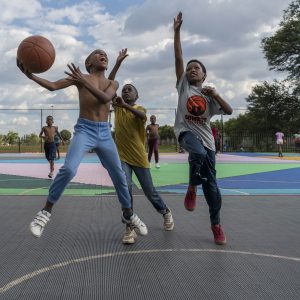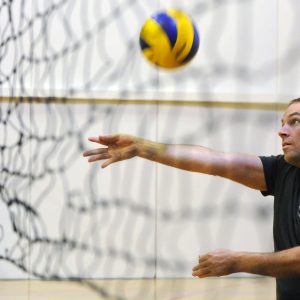Murderball needs money to thrive
The players are talented and passionate, but wheelchair rugby costs money. One player has begun making chairs locally to make it more affordable, but more can be done to produce Paralympians.
Author:
21 April 2021

It’s not called murderball for nothing. The sport is brutal, high-impact and an adrenaline blast, and was originally designed to be played by quadriplegic athletes.
South Africa may be world champions in the 15-player version of the sport and pretty high up the rankings in Sevens, but a determined bunch of athletes is eager to make their mark internationally as well – in wheelchair rugby.
While the South African wheelchair rugby team have the talent and the passion, financial constraints are holding them back. The sport requires highly adapted wheelchairs, and because of this they haven’t competed internationally in six years. But the team are far from giving up.
Wheelchair rugby is played on a basketball-sized court by teams of up to 12 players – men and women – four of whom are allowed on court at a time. According to the International Wheelchair Rugby Federation, “it is an invasion and evasion game, the object being to carry the ball across the opposing team’s try line to score tries. Of course, it’s not quite as simple as that.”
The players have impairments to their arms and legs and are classified according to a points system that measures their ability. The lower the number, the greater the impairment. The points of each player on court added together cannot exceed eight points per team, but an extra half a point is allowed for female players.
“To buy a new rugby chair costs around R130 000,” said South Africa Wheelchair Rugby chairman Clyde Holland, who has been in the national team since 2009. “So, if you have a national team together, you’ve got around 10 players – R1.3 million just on the chairs – before you have even looked at training camps, touring, kit and staffing.”
When Holland started out in the sport, he initially bought a second-hand chair, having been introduced to wheelchair rugby in rehab after breaking his neck in a skydiving accident in 2003. “I spent 48 days in ICU … I was broken. Then I went into rehab for 96 days and then I was let out into this new world. How life changes. I always tell people rehab starts when you get home,” he said.
Related article:
“When I was in rehab, Victor [Buitendag] was selling wheelchairs there at the time. He was in a wheelchair and he told me about the sport. So, I left rehab on Friday and started playing wheelchair rugby on Monday.”
Unlike wheelchair basketball, which is usually played by paraplegic athletes, wheelchair rugby was designed with quadriplegics in mind.
“It’s obviously developed into taking a whole bunch of other disabilities, which is great,” said Holland. “It makes the sport faster. It brings more people in. Purists say it has taken the sport away from what it was really designed for, but the only constant in life is change. So, if you’re upset, then you need to get in your chair and you push harder to make sure that you’re selected.”

Financial challenges
One of those athletes, who isn’t usually in a wheelchair but has excelled at the sport, is Musa Simelane. He was born with impairments to his hands and feet. “The first time I tried it out, it was very hard and I didn’t enjoy it. But over time, as I trained more often, I actually ended up liking the sport,” said Simelane, a recent corporate and marketing communications graduate from Bloemfontein, who made the national team in 2015.
“This is the only sport where wheelchairs can be in contact with each other, so that’s scary and fun at the same time. Even if you fall with the chair, you don’t experience injuries that could possibly take you out of the game as you are strapped on your chair. What used to scare me the most was when two chairs knock each other out really hard. The loud bang can put one off if you’re not used to it.”
Explaining his love for the sport, Simelane added: “It makes you want to be better every time. Each year comes with its own challenges, but we have managed to overcome all of them. We aren’t perfect, but consistent hard work and support from the team really does pay off in the end.”

It is Holland’s love for the sport and the camaraderie that have kept him in it for so long. “I like the fitness side of it, I like the team side of it and playing the sport. I enjoy the tactics when a team really gels together and the plans come together. It really is an awesome sport. But I also like to see what it does for other people. I’ve seen people come to the sport in electric wheelchairs and they go out on a day chair. I’ve seen people come to the sport and being driven around, and suddenly seeing what other people are doing and going out thinking, ‘I can do that as well.’”
The sport is certainly one that has lifted many an athlete out of a particularly dark place. Considered one of the best wheelchair rugby players in history, Australia’s two-time Paralympic gold medallist Ryley Batt recently told the Daily Mail Australia newspaper: “Sports pulled me out of a dark hole and the elite level of the Paralympic Games pushed me to be better in that sport. I have done things in life now that I probably never would have done with legs. I am glad that I was born with a disability. I am very proud of my accomplishments and my life.”
In South Africa, though, every time the talk heads in the direction of playing internationally and one day qualifying for the ultimate showcase, the Paralympics, it always comes back to finances and the prohibitive cost of the sport. One man who is seeking a solution to that problem is another national team player, Jared McIntyre.
Related article:
“Regarding the rugby chairs, there are no manufacturers in South Africa. All chairs are imported from overseas and they are very expensive,” he explained.
“This makes it extremely difficult for any athlete or club in South Africa to purchase their own chairs. If there are more people taking part in the sport, there will be more awareness, the possibility of more funding, greater possibility of sponsorships from corporates, as well as support from government. Therefore, we need more bums in chairs.
“To achieve this, South Africa needs to do proper development of the sport on all levels to ensure the longevity of the sport as well as to reach the high performance goals of international tournaments such as World Championships and Paralympics. This will require starting on grassroots level,” said McIntyre.
“Unfortunately, we will not be able to achieve this, nor reach the masses, with expensive imported chairs. So I identified a cost-effective solution to the problem, which will help address the challenge and has the potential to make a major impact in the sport on all levels, in South Africa as well as internationally.”
What SA needs to be a force
McIntyre has begun manufacturing rugby chairs locally. “We have manufactured 16 chairs already and are in the process of registering the company,” he said.
“With the rugby chairs we manufacture, I believe that more people will be able to afford their own, but more importantly, more development programmes can be started. Regarding the cost, I am waiting for updated pricing on material, as the prices have drastically increased from the beginning of lockdown. But I estimate we will still be able to manufacture the rugby chairs for a fifth of an imported chair’s price.”
Related article:
At the moment, there are around 10 wheelchair rugby clubs in the country, with a national league and interprovincial tournament taking place each year. But bringing down the cost of equipment would certainly boost these numbers.
Meanwhile, Holland is confident South Africa has the potential to compete at the Paralympics one day, if given the right support. That would mean qualifying as one of the top eight teams in the world. The South Africans have been ranked as high as 17th, but not having played internationally since 2015 has seen the team slip to 31st, the bottom of the world rankings.
“We just dropped down and down, which is very sad for a country that’s so rugby crazy. We’ve got the athletes, though. We haven’t started scratching the surface of the talent that’s available,” said Holland.
Simelane agreed. “If sponsorships could let loose and provide athletes with everything that they need to be at the same level as some of the best teams in the world, then yes, our country will be very much competent in this sport worldwide.
“A lack of sponsorship delays the talent that should be out there performing at the highest level. Some players are also losing hope. Some come from poor families, and with their God-given talent they thought the sport was going to change their lives. It’s clear it will take many more years before the sport is taken really seriously, but I have hope that things will get better some day.”



